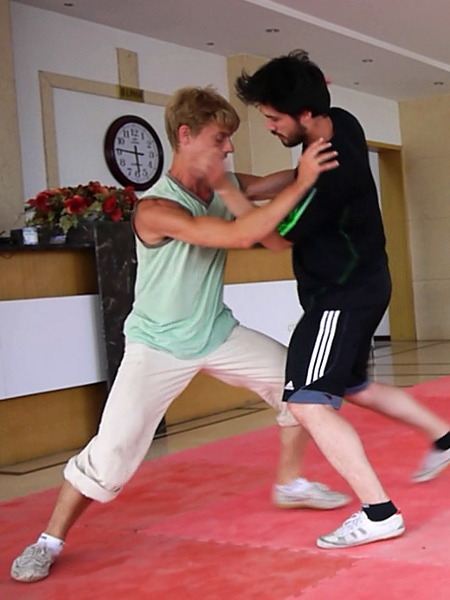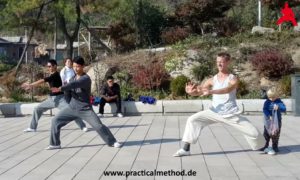A shift of paradigm for psychological health
Most of us did grow up in societies and systems which have a strong emphasis on competition. We literally got trained to be able to compete. Doing opposite is considered as not very smart, maybe even dangerous, and there is a lot of the fear around also. The fear of not surviving “against” the others, or at least to be cheated all the time. To think opposite in this very likely is considered to be naive.
Being an artist in the fields of music and the martial and healing arts from Asia, I was exposed to the idea of “non-competitiveness” already much earlier in my life. But just recently, after a few month living in Sadhana Forest, a unit of the international township of Auroville in South India, something in my life changed quite a bit, and my understanding of this idea of non-competitiveness became much deeper.
One of the major ideas, which Auroville was build for, is to create a new society, striving for human unity and therefore creating true brotherhood. I think it is quite obvious that brotherhood and competition are contradictions in a way. The one is cooperation and compassion, the other is working against each other. Simple and clear, isn’t it? But in real life maybe things are not that easy …
A Recent experience
For half a year we did live at Sadhana Forest, a particular unit of the international township of Auroville. There one has to agree on a bunch of rules, and one of them is to play non-competitive games only, when being in the community. Then, a few weeks later, I had kind of a funny experience:
At one of the meals another volunteer asked me: “How good is this dessert? How would you rate it on a scale from one to ten?”, and I instantly had a very hard time to give an answer. I used to ask the same kind of question here and there, but now, all of a sudden, my brains simply feld like a computer when you enter an invalid command … “syntax error” … I was not able to give that mark, I was just able to say: “One to ten … I don´t know, but it is very good!”
Then I started to think about it and a little enlightenment came into my mind: yes, rating things and comparing, this also came out of the very common “mindset of competitiveness”, and for several reasons I think we really should overcome it.
I noticed mainly 2 things:
1. This kind of mindset (competitiveness) creates a lot of pressure and harm
2. This kind of mindset is even completely unnecessary
The common paradigm is exactly opposite to these statements …
So please let me explain, how I came to this conclusion:
As mentioned in the very beginning, we all got quite well trained in being able to compete (out there on the “free” market). The common opinion is that we need to, otherwise we would not survive. As so often, I think, this is just one of many possible point of views, because we can also recognize that we are social beings, we need others, we need community, but in our modern societies very likely this “community”, the brotherhood-like being together, melted down to the closest members of our families only. Everybody outside of our bloodline is to be treated more or less suspicious. Of course there are always completely different worlds in our societies, so maybe you have completely different surroundings, like I had when lived in Berlin as a Taijiquan teacher and Shiatsu practitioner. But the folks I had contact to all the time where clearly not the mainstream.
Whatsoever, I think we have the choice ether to live in a way that we think we have to fight against everybody all the time (win the competition), or we look for brotherhood, being open hearted and open minded as much as we can. According my own experience, even in the “normal civilised world”, the second option works very well and give us a much more rewarding life on all levels. This is the light, this is connection, being really together with others, being able to share everything openly. The other one is a state of separation and loneliness, we need to do and carry everything by ourself, and we live in kind of darkness, seeing more evil things than good things, not getting in a real contact with others. By real contact I mean to meet people from heart to heart, with no bit of a ly, being completely open without any fear. For me, only this is truly being together and sharing things.
Competitive mindset simply makes this kind of being impossible.
This was to explain my 1st statement, and about the 2nd:
Being an artist I experienced a lot and different kinds of evaluations, which we as artists in general tend to believe in. We might think that outer evaluation is important for our progress. Today I think that in the first place the evaluation has nothing to do with the learning progress. The learning is the action, can be an exercise, but also a very free play (like children). The second one actually is worth to write whole books on, but I will spare this for here. Just want to mention, that even top scientists in Germany approved the statement, that the free play of a kind is the most efficient way of learning (check out “Gerald Hüther”, “Arno Stern”, “André Stern” and the “Play of paint” e.g.).
But then the evaluation is not this action at all, it is only an evaluation. If it is a good or a bad thing totally depends on how we deal with it afterwards. And this is a matter of psychology. The Art or whatever thing we want to learn does not ask for it. Today I have the strong impression that these evaluations create much more harm than being useful, but also this will be topic of another article. For here I think it is enough to realize that evaluations are not necessary for the progress. The only thing that is necessary is to go on with the action itself. And further, we might need to have a picture of where we want to go, depending on the specific art or topic. And for exactly this we do not need to compare ourself to others. The only kind of comparison which might be really useful is to compare to ourself, from yesterday to today e.g., in order to check if we are still “on track” in our development.
I am very sure, that letting go of the paradigm that we need evaluation and competition, for most people (especially in the modern western world) would just set free so much blocked energy, the mind and heart could ease up so much, and the results in the end would be even much better without all the stress.
So this already was my little message here, I am pretty convinced that in the sake of personal development we do good to overcome competitiveness on a very fundamental level. If you want to know little more about how I came to this conclusion, here some technical details from my experience:
Martial Arts training
 The particular style of Martial Arts that I am practising is “Chen Style Taijiquan Practical Method” as a disciple of Master Chen Zhonghua, the international standard bearer of this school (lineage of Masters: Chen Fake – Hong Junsheng – Chen Zhonghua). It is a special style of Taijiquan (also “Tai Chi”, “Taiji” or “Tai Chi Chuan”). Most other styles of Taijiquan follow a very different approach than we do. Therefore I need to mention, that in our school we keep the original meaning of Taijiquan as a martial art, and we do not mix up the content of the training with Qigong (energy work in the sense of health and spiritual development). But also we do not mix the content with other martial arts. Our style is purely rooted in the Chinese Daoist culture, but the training first of all is very physical. It is “a physical experiment of Daoist principles”, like our Master did explain earlier.
The particular style of Martial Arts that I am practising is “Chen Style Taijiquan Practical Method” as a disciple of Master Chen Zhonghua, the international standard bearer of this school (lineage of Masters: Chen Fake – Hong Junsheng – Chen Zhonghua). It is a special style of Taijiquan (also “Tai Chi”, “Taiji” or “Tai Chi Chuan”). Most other styles of Taijiquan follow a very different approach than we do. Therefore I need to mention, that in our school we keep the original meaning of Taijiquan as a martial art, and we do not mix up the content of the training with Qigong (energy work in the sense of health and spiritual development). But also we do not mix the content with other martial arts. Our style is purely rooted in the Chinese Daoist culture, but the training first of all is very physical. It is “a physical experiment of Daoist principles”, like our Master did explain earlier.
We work out the physical requirements very carefully. The whole training should be practical, every move should become applicable in a fighting situation. Therefore we also do to go to competitions here and there, and we practice “Pushhands” in a way that the opponents try to do things with real power, so that we can test, experiment and train in a most real way.
Especially in this context it is very interesting to research ourself and see, if we really can be “non-competitive”. At some point, this is very important to progress in the art. We need to “invest into loosing” in order to learn the right method and technique. The “correct” one in the sense of our system is completely opposite to the habitual moves and reactions that we have. Therefore our first attempts to apply moves correctly CANNOT work right away. We need to train very hard to overcome very strong and deep habits, and only then the “right” method in the sense of our system can start to develop.
At this stage we will never “win” a fight, we need to “invest into loosing”. This will challenge the ego quite a bit/lot …
 Then there is the form training. Those nice and easy looking sets of movements, done solo or together in a group. Though these are without touching a partner, it is the form training which creates everything in Taijiquan. Those forms are designed for a real training, but usually everybody wants to “look good”, and even worse, maybe this was even one of the first reason to learn Taijiquan … In this case, a very important correction in our thinking needs to take place: the Taiji moves are not about to “look good”, it is a training with a lot of internal aspects, and those cannot be seen in the beginning. When we only copy the outer appearance of the Master, who moves in this very graceful and smooth way, most likely we will miss the real training. When staying on the track, the desired “good look” will happen only after a very long time, and in between there will be a lot of “eating bitter”. We will experience quite fundamental changes in ourself, and we will see that the “good look” is not only totally unimportant, it is also very misleading.
Then there is the form training. Those nice and easy looking sets of movements, done solo or together in a group. Though these are without touching a partner, it is the form training which creates everything in Taijiquan. Those forms are designed for a real training, but usually everybody wants to “look good”, and even worse, maybe this was even one of the first reason to learn Taijiquan … In this case, a very important correction in our thinking needs to take place: the Taiji moves are not about to “look good”, it is a training with a lot of internal aspects, and those cannot be seen in the beginning. When we only copy the outer appearance of the Master, who moves in this very graceful and smooth way, most likely we will miss the real training. When staying on the track, the desired “good look” will happen only after a very long time, and in between there will be a lot of “eating bitter”. We will experience quite fundamental changes in ourself, and we will see that the “good look” is not only totally unimportant, it is also very misleading.
Now I clearly want to refer striving for “looking good” to the competitive mindset. Be want to make an impression, look better than others to catch the attention. Or, quite likely, the opposite: we cannot stand being watched while training. Finally the external aspect seems to be important in the one or the other way.
In this, I personally have the feeling that only when being not watched I can really “train” well, 100% not distracted. When being watched it is an aspect of the training, to train not to be distracted, and the result is just relative.
As we can see in these two examples from our training, we need to overcome the common mindset of competitiveness in order to advance within the art. The art itself seems to demand it …
Music
 Another example, that I experienced even earlier in my life, is music. In general, for us listening to music means joy, relaxation, inspiration, etc. Then some people decide to learn to play an instrument, and then, when it comes to evaluation, we judge a lot, and an amazing amount of psychological pressure may be created. Especially in the professional field we find this a lot.
Another example, that I experienced even earlier in my life, is music. In general, for us listening to music means joy, relaxation, inspiration, etc. Then some people decide to learn to play an instrument, and then, when it comes to evaluation, we judge a lot, and an amazing amount of psychological pressure may be created. Especially in the professional field we find this a lot.
Later on, those musicians might quit, even if they reached a professional level, or they don’t quit but are deeply unhappy with their profession, or they need to dig deep into the topic, doing psychological therapies. Have a look at the book “Effortless Mastery” by Kenny Werner, for instance.
Obviously, the original intend for music, joy and inspiration, got reversed in the exact opposite. I think, the reason for that is the competitive mindset as well. This mindset I would define not only as being competitive, but also having an exaggerated need for measurements and evaluations, feeling very insecure without those, not being able to just go with the flow, knowing a very rigid form of discipline only. Finally we will evaluate our self-worth as human beings according what results we have in the art. And when ending up there we must clearly see, how sick this path was. Right?
Also here I noticed: the exercise changes significantly when there is somebody listening. Only when being in a room totally by myself, I can work purely on the exercise. Otherwise, “practising” and “performing” are mixing up.
Maybe with a totally enlightened state of mind this will change, and being observed while practising might not influence us any more …
Easing up – let go
I think, the only response to this issue for the now can be: to let go. Let go judgements, fear of not knowing, fear in general, ego, wanting to be better than others, etc. This does not mean that we have to let go all our goals, and especially we don’t need to let go our ambitions to get better! The point here is that in order to progress in whatever art or self-development, we do not need to compare ourself to others. We just need to stay on our own track of development, keep on practising, keep on playing, naturally becoming better every day.
Perception & Judgements
Actually, in general we are not able to judge at all. We all have our personal filters in perception, especially in perceiving ourself. I can only share from my own experience, of course, but I am quite sure that from the following we can see some general principles, and practitioners of other arts might share the same kind of experience. I made this experience as a musician and as a practitioner of Taijiquan.
To experience this you can do one of those experiments:
In music:
Simply record yourself, or even better, record jam sessions and rehearsals that you do together with others. Then listen to the recordings, once right away, and at least one more time some days later. I found a lot of surprises by doing this. In the beginning the recordings where very different of what I did expect, and even the perception a few days later changed. And of course it was not the recording that changed … 😉
In the Taiji training:
A little more complex, but after years of training, and then also teaching, I found that the perception of ourself our self-evaluation very likely is directly opposite to the reality.
Whenever we really progress, we need to go to the unknown, where we have not been before. At this moment, we strongly tend to feel uncomfortable and insecure. Naturally we want to avoid this. In the training-process I very often see people evaluating them-self very wrong: They obviously progress, but feel like even getting worse. And also the opposite: not realising any problem, no change but feeling very confident … 😉
The technical explanation is quite simple:
One starts to exercise something what have not been doing before. This “something” is something new, therefore the attention never has been there before, so the “amount of mistake” that we do in the move in the beginning is totally not perceive-able for us. While we train, two things are happening simultaneously: we improve, but also our senses according the specific aspects improve. Therefore we start to perceive the “amount of mistake” better and better, the feeling gets worst and worst.
Or the opposite: We do not really enter the exercise, maybe we externally copy some moves, but we do not really follow the instructions, but we THINK we did. In reality there is no change happening at all, and we never loose our “confidence”, because this irritating feeling of vulnerability will not occur.
In life
I recognized the competitive mindset as the source of a lot of psychological issues, and vice versa, a truly not competitive mindset as a key feature to self liberation and true brotherhood.
Have a close look into yourself: isn’t there a lot of pressure we create all the time, the pressure of being “good”, “better”, or “good enough”, and a lot of worries that we might not, concerns what others might think about us doing this or that …
Then next, what about being suspicious? For what reasons are we suspicious, and how does this affect our perception of reality?
I observed in others a very big deal of affection in perception by being suspicious, and also then real things start to change. People with true good-will in the beginning can change when treated badly, e.g. All this is happening in reality, we create our own “bad environment”, just because we feel the need to compete all the time …
Discussion
So hopefully you are moved or provoked by this text, of course this is all just my opinion, so every discussion on the topic is very welcomed. Only one request: please discuss it here on this website in the comments only, if you want me to respond to it and also if you want others to read it. Only here on the blog the comments will be visible for everybody.
Thanks for your understanding!

